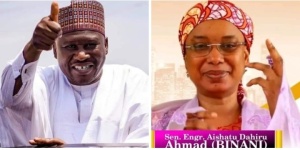Edo State Governor, Godwin Obaseki, has provided clarity on his stance regarding the succession bid of his deputy, Comrade Philip Shaibu. The governor emphasized that the current phase of governance is not conducive for intense politicking and that his priority remains focused on the welfare of the Edo people.
In a media statement issued by his Special Adviser on Media Projects, Crusoe Osagie, Governor Obaseki made it clear that his decision not to support Shaibu’s governorship aspiration at this time is a well-considered one. He asserted that engaging in intense political maneuvering would only serve as a distraction from the crucial governance tasks at hand.
Osagie further expressed the governor’s belief that Shaibu’s recent actions, perceived as indiscipline and hubris, undermine the harmony of their partnership. He referred to Shaibu as a “rabble-rouser” who had pushed the boundaries of decorum by attempting to create a crisis within their working relationship.
“The most blame goes to Governor Obaseki for trying to adopt a civilised manner in relating with his deputy, in a society where such gesture would be taken for weakness,” Osagie added.
The rift between Governor Obaseki and Deputy Governor Shaibu emerged due to the latter’s intention to contest the upcoming gubernatorial election. The governor is reportedly supporting a Lagos-based professional as his preferred successor. This discord led Shaibu to seek legal protection from potential victimization, and he is currently out of the country.
Addressing the situation, Dr. Tony Aziegbemi, Chairman of the Edo State chapter of the Peoples Democratic Party (PDP), assured that the party’s leadership is working diligently to mediate and resolve the conflict between Obaseki and Shaibu. He stressed that their efforts are aimed at fostering peace and unity within the party.
Meanwhile, the Assistant Publicity Secretary of the All Progressives Congress (APC) in Edo, Victor Osehobo, criticized Obaseki’s political approach, labeling it as an ill-fated attempt to become a godfather in the state. Osehobo highlighted Obaseki’s contradictory stance, noting that he opposed godfatherism while now seeking to assume a similar role.
Osehobo elaborated on the concept of a political godfather, emphasizing the need for commitment, mentorship, and positive influence. He asserted that Obaseki’s actions, particularly his strained relationship with his own political mentor, undermine his aspirations to become a prominent figure in Edo politics.
The unfolding dynamics in Edo State reflect a complex interplay of political ambitions, governance priorities, and party dynamics. As the situation continues to evolve, the state’s residents and political observers remain vigilant, awaiting the resolution of the existing conflicts and the ultimate trajectory of the state’s political landscape.










